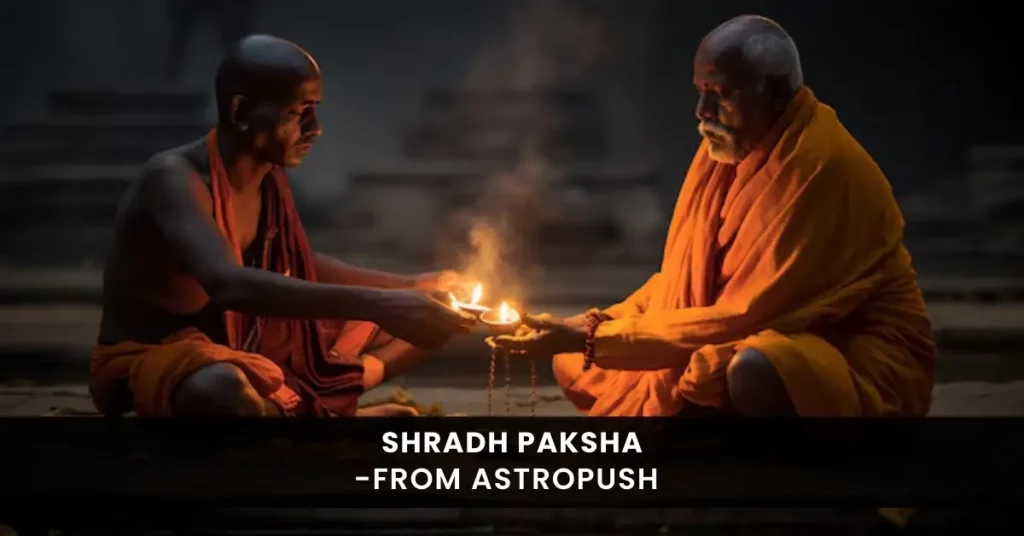Shradh (Pitru) Paksha is a significant period in the Hindu calendar. During these 16 lunar days, families pay their respects to their deceased ancestors by offering a special ritual called pind daan. This ritual is a way of showing gratitude and love to those who have passed away.
Also Read – Shubh Muhurat August 2025 – Auspicious Timings for a Prosperous Life
This particular period, known as Shradh, takes place during the Krishna Paksha, which is the phase of the moon when it’s fading. It falls between the full moon day (Purnima) and the new moon day (Amavasya) in either the Hindu month of Ashwin or Bhadrapada.
In the year 2024, Shradh will start on September 17 and conclude on October 2. Additionally, it includes several crucial dates for performing Shraadh rituals. Here’s a guide to the key dates:
- Pratipada Shradh: September 18
- Panchami Shradh: September 22
- Ashtami Shradh: September 25
- Mahalaya Amavasya: October 2
Also Read – Pitru Paksha: A Time for Remembrance and Reverence
By performing Shradh, we believe that we can help our ancestors find peace and closure in the afterlife. It’s a way of ensuring that any unresolved issues or karmic debts they may have do not affect our lives or the lives of our descendants. Many people take this tradition seriously and make it a point to observe these dates every year because it holds a special place in Hindu culture and spirituality.
History and Significance of Shradh Paksha
The Pind daan or Shradh ritual has been a part of Hindu traditions since ancient times, dating back to stories from the Ramayana and Mahabharata.
- In the Ramayana: Lord Rama visited Gaya Ji for pind daan, and some even believe that Goddess Sita also performed this ritual. This suggests that women can participate in it too.
- In the Mahabharata: After Karna’s death and his arrival in heaven, he was given precious materials like Gold and Diamonds to eat. When he inquired why, Lord Indra explained that Karna had never offered food to his ancestors during his life on Earth. Karna was unaware of his ancestors, so Lord Indra sent him back to Earth to perform Shradh during the 16-day Pitru Paksha period.
Also Read – Shardiya Navratri: Astrological Insights
This story highlights why Shradh and the 16-day Pitru Paksha period are significant to Hindus. It’s a way to honor and provide for one’s ancestors. According to the Brahma Purana, it’s important to worship ancestors before the Gods because it pleases the Gods greatly. If ancestors do not receive proper rituals after death, their souls may wander aimlessly on Earth. During Pitru Paksha Shraddha, various rituals are performed to give peace to departed souls and cleanse them of their sins.
In essence, Pitru Paksha Shraddh is a time-honored tradition that not only helps in acknowledging and paying respects to ancestors whose death dates have faded from memory but also reinforces the importance of family, lineage, and the continuity of traditions in Hindu culture. It’s a period when families come together to perform these rituals collectively, often seeking the guidance and blessings of their forefathers. It serves as a way to connect with one’s roots and maintain a strong bond with the past.
Here are the important dates for Pitru Paksha Shradh in 2024:
- September 17, Tuesday: Shradh for Purnima (Tarpan in the name of the Rishis)
- September 18, Wednesday: Shradh for Pratipada Tithi (Start of Pitru Paksha)
- September 19, Thursday: Shradh for Dwitiya Tithi
- September 20, Friday: Shradh for Tritiya Tithi
- September 21, Saturday: Shradh for Chaturthi Tithi
- September 22, Saturday: Shradh for Panchami Tithi
Also Read – Amavasya – Types, Significance, Dark Side and More
- September 23, Monday: Shradh for Shashti and Saptami Tithis
- September 24, Tuesday: Shradh for Ashtami Tithi
- September 25, Wednesday: Shradh for Navami Tithi
- September 26, Thursday: Shradh for Dashami Tithi
- September 27, Friday: Shradh for Ekadashi Tithi
- September 29, Sunday: Shradh for Dwadashi Tithi
- September 30, Monday: Shradh for Trayodashi Tithi
- October 1, Tuesday: Shradh for Chaturdashi Tithi
- October 2, Wednesday: Sarva Pitru Amavasya (Culmination)
Also Read – Pitru Paksha 2024: Honoring Ancestors and Embracing Spiritual Reflection
Do’s and Don’ts During Pitru Paksha:
Do’s:
- Consult a Pandit for specific guidance during Pitra Pooja or Shradh rituals.
- Avoid purchasing new items throughout the 16-day Pitru Paksha period.
Also Read – Kanya Rashi 2025 – Yearly Horoscope, Predictions, and Remedies
- Refrain from engaging in any other auspicious activities apart from the Shraadh rituals.
- Say no to non-vegetarian food during this time.
- The person performing the ritual should avoid cutting nails, having haircuts, or shaving during this period.
- If possible, avoid wearing slippers at home for the 16 days, especially the eldest son, to show respect to ancestors.
- Maintain Brahmacharya, which means having a balanced diet, speaking less, being polite, and avoiding romantic involvement.
- Stay away from foods like Gram, lentils, cumin, black salt, gourd, cucumber, and mustard greens during this period.
- Use the door of your own house for Pind daan, as the benefits for your ancestors’ souls are confined within your home boundaries.
Also Read – Swastik: The Sacred Symbol in Hinduism
Don’ts:
- Avoid starting new projects or business ventures during Pitru Paksha, as it’s considered inauspicious for new beginnings.
- Try not to buy or wear new clothes during this period.
- Refrain from shaving beards or hair and washing clothes, especially on the last day, Mahalaya Amavasya.
- Steer clear of consuming onion, garlic, and non-vegetarian food items during this time.
- Plan auspicious events like child naming ceremonies, marriages, or moving into a new house either before or after Pitru Paksha, as this period is considered unfavorable for such activities according to astronomical calculations.
- Refrain from consuming alcohol or any such activities.
Also Read – Dangerous Doshas In Kundali | Know How They Impact Your Life
Performing Shradh and Tarpan Rituals When the Date of Death is Unknown
If you don’t know the exact date when someone passed away but want to perform the important Hindu rituals of Shradh and Tarpan dedicated to your deceased ancestors, there are several options available.
Firstly, if you know the month in which the person passed away but not the specific date, you can choose to perform Shradh and Tarpan on the Amavasya, which is the no moon day, in that particular month. This is a suitable way to honor your ancestors when you have a rough idea of the timing.
Also Read – Govardhan Puja: A Celebration of Appreciation and Faith
Another option is to perform these rituals on the date when you received the news of the person’s death. This can serve as a meaningful way to pay your respects even if you don’t have the exact date.
If you’re uncertain about both the date and the month of the person’s passing, you can perform Shradh and Tarpan on Magh Amavasya or Margashirsha Amavasya. These are the no moon days in the Magh or Margashirsh month, respectively.
Additionally, you have the option of offering water daily to your ancestors, which also constitutes a form of Shradh. This can be done every morning as a way to show your love and respect.
Finally, if you prefer an annual observance, you can perform Shradh and Tarpan on Mahalaya Amavasya, which is a special day dedicated to honoring ancestors and is observed once a year.
Also Read – Pitra Dosh: Meaning, Effects, and Remedies for Every Zodiac Sign
Shradh Paksha Rituals
In Pitru Paksha Shraddh 2024, we follow customs and traditions like:
- Pind Daan: This is where we offer rice balls (Pind) made with special ingredients like ghee, honey, rice, goat’s milk, sugar, and sometimes barley to our ancestors.
- Tarpan: We offer water mixed with flour, barley, Kusha Grass, and black sesame to our ancestors.
- Feeding Brahmin Priests: We provide food to Brahmin priests and read stories from holy scriptures.
Additionally, we perform the Pitra Dosha Nivaran Puja to counter any negative effects from ancestral issues.
Also Read – Hindu Calendar: Calendar of the year, Festival Calendar and Much More
Shradh for Missing Persons in Hindu Religion:
- When someone goes missing for a long time, some Hindu communities assume they are no longer alive and perform death rituals.
- Generally, after 12 years of being missing, the family considers the person deceased, and the rituals are performed.
- Since there’s no physical body, they create a symbolic one using Durva or Kusha Grass and burn it on a pyre to signify the person’s passing.
- After this, they follow regular Shradh rituals.
Note: Families only do this when they are certain the missing person is unlikely to be alive, especially if the person is very old.
Also Read – Kulik Kaal Sarp Dosh: Significance, Impact, Solutions, and Advantages
Shradh Tarpan and Death Rituals for Those Who Committed Suicide:
- On the fourteenth day during the Pitru Paksha fortnight (known as Ghat Chaturdashi), Hindus perform special rituals for those who have committed suicide.
- This day falls on September 17, 2024, Shradh for Purnima (Tarpan in the name of the Rishis)
- It’s believed that souls of those who died unnaturally may not find peace, so special pujas and rituals are done to help them rest in peace.
- The Pitru Paksha fortnight, during the Krishna Paksha of Ashwin month, is considered suitable for offering peace to such souls.
Also Read – A Dive into the World of Hindu Gods and Goddesses
Important: It’s best to perform all Shradh rituals with the guidance of an experienced elder or a qualified priest.
AstroPush – Your Astrology Guide
In conclusion, Shradh Paksha holds immense significance in Hindu tradition, offering an opportunity to honor and pay respects to departed ancestors.
Also Read – Aarti: The Ceremony of Lights
Understanding the rituals and important dates in 2024 can help individuals observe this period with reverence and devotion. At AstroPush, we acknowledge the importance of ancestral rites and offer a range of services to support your spiritual practices. Whether you seek guidance on Shradh Paksha rituals or assistance with other astrological matters, such as talk to astrologers, free Kundli and horoscopes, Kundli matching, numerology, panchang, and more, our platform is here to assist you. Feel free to reach out to us anytime through our website or chat platform to explore the significance of Shradh Paksha and access the resources you need for a meaningful observation.
Download the application now!
Follow us on Instagram, to learn more about Astrology!
FAQs
Can women perform Shradh Paksha Rituals?
Answer: Yes, women can perform Shradh rituals. In fact, daughters, wives, sisters, and daughters-in-law have the right to perform Shradh. In Sanatana Dharma, there is no difference between sons and daughters.
Why Shradh is Important?
Answer: During this time, people worship their ancestors for blessings and forgiveness. This helps them achieve Moksha, freedom from the cycle of birth, death, and rebirth. They make offerings like Pind Daan and Tarpan. Shradh Puja exemplifies India’s strong belief in its culture.
What time is not suitable for performing Shradh?
Answer: It is considered inappropriate to perform Pitru Paksha Shradh during the bright fortnight (Shukla Paksha). It is also advised to avoid performing the rituals at night, on the sum of two dates falling on the same day, and on someone’s birthday.
Also Read – Rudra Abhishek – A Powerful Vedic Ritual to Please Lord Shiva
What should I do if I can’t perform Shradh during Pitru Paksha?
Answer: If you missed doing Shradh during Pitru Paksha, you can do it before Kartik Month ends. In North India, Shradh usually happens in Ashwin Krishna Paksha, while in other regions, it’s in Bhadrapada Krishna Paksha. Don’t worry; you have a little more time to perform it.
Can I cut my Hair or Nails during Shradh Paksha?
Answer: If you’re doing Shradh for 16 days during Pitrupaksha, don’t trim your beard, hair, or nails. But it’s okay for other family members to do so. Also, make sure you wear clean clothes during these 16 days.



